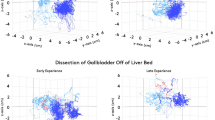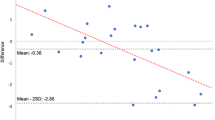Abstract
Introduction
Operative time has been traditionally used as a proxy for surgical skill and is commonly utilized to measure the learning curve, assuming that faster operations indicate a more skilled surgeon. The Global Evaluative Assessment of Robotic Skills (GEARS) rubric is a validated Likert scale for evaluating technical skill. We hypothesize that operative time will not correlate with the GEARS score.
Methods
Patients undergoing elective robotic sleeve gastrectomy at a single bariatric center of excellence hospital from January 2019 to March 2020 were captured in a prospectively maintained database. For step-specific scoring, videos were broken down into three steps: ligation of short gastric vessels, gastric transection, and oversewing the staple line. Overall and step-specific GEARS scores were assigned by crowd-sourced evaluators. Correlation between operative time and GEARS score was assessed with linear regression and calculation of the R2 statistic.
Results
Sixty-eight patients were included in the study, with a mean operative time of 112 ± 27.4 min. The mean GEARS score was 20.1 ± 0.81. Mean scores for the GEARS subcomponents were: bimanual dexterity 4.06 ± 0.17; depth perception 3.96 ± 0.24; efficiency 3.82 ± 0.19; force sensitivity 4.06 ± 0.20; robotic control 4.16 ± 0.21. Operative time and overall score showed no correlation (R2 = 0.0146, p = 0.326). Step-specific times and scores showed weak correlation for gastric transection (R2 = 0.0737, p = 0.028) and no correlation for ligation of short gastric vessels (R2 = 0.0262, p = 0.209) or oversewing the staple line (R2 = 0.0142, p = 0.344).
Conclusions
Operative time and crowd-sourced GEARS score were not correlated. Operative time and GEARS scores measure different performance characteristics, and future studies should consider using both a validated skills assessment tool and operative time for a more complete evaluation of skill.



Similar content being viewed by others
References
Kassite I, Bejan-Angoulvant T, Lardy H, Binet A (2019) A systematic review of the learning curve in robotic surgery: range and heterogeneity. Surg Endosc 33(2):353–365
Goh Alvin C, Goldfarb David W, Sander James C, Miles Brian J, Dunkin BJ (2012) Global evaluative assessment of robotic skills: validation of a clinical assessment tool to measure robotic surgical skills. J Urol 187(1):247–252
Sánchez R, Rodríguez O, Rosciano J et al (2016) Robotic surgery training: construct validity of Global Evaluative Assessment of Robotic Skills (GEARS). J Robot Surg 10(3):227–231
Kaler KS, Valley ZA, Bettir KC et al (2017) Crowdsourcing evaluation of ureteroscopic videos using the post-ureteroscopic lesion scale to assess ureteral injury. J Endourol 32(4):275–281
Birkmeyer JD, Finks JF, O'Reilly A et al (2013) Surgical skill and complication rates after bariatric surgery. N Engl J Med 369(15):1434–1442
Chen J, Cheng N, Cacciamani G et al (2019) Objective assessment of robotic surgical technical skill: a systematic review. J Urol 201(3):461–469
Peabody JO, Miller DC, Linsell S et al (2015) 192 Wisdom of the crowds: Use of crowdsourcing to assess surgical skill of robot-assisted radical prostatectomy in a statewide surgical collaborative. Eur Urol Suppl 14(2):e192–e192a
Chen C, White L, Kowalewski T et al (2014) Crowd-sourced assessment of technical skills: a novel method to evaluate surgical performance. J Surg Res 187(1):65–71
White L, Kowalewski T, Dockter R, Comstock B, Hannaford B, Lendvay T (2015) Crowd-sourced assessment of technical skill: a valid method for discriminating basic robotic surgery skills. J Endourol 29(11):1295–1301
Aghazadeh MA, Jayaratna IS, Hung AJ et al (2015) External validation of global evaluative assessment of robotic skills (GEARS). Surg Endosc 29(11):3261–3266
Zhang H, Chen L, Wang Z et al (2018) The learning curve for robotic mckeown esophagectomy in patients with esophageal cancer. Ann Thorac Surg 105(4):1024–1030
Funding
This work was supported by a grant from the Society of American Gastrointestinal and Endoscopic Surgeons.
Author information
Authors and Affiliations
Corresponding author
Ethics declarations
Disclosures
Dr. Yoo is a full-time employee for C-SATS, Inc, a subsidiary of Johnson and Johnson. Dr. Teixeira is on the clinical advisory board for C-SATS, Inc. Dr. Filicori is a consultant for Cambridge Medical Robotics. Mr. Dechario, Drs. Addison, Duarte-Ramos, Addy, Husk, Jarrett, and Antonacci have no conflicts of interest or financial ties to disclose..
Additional information
Publisher's Note
Springer Nature remains neutral with regard to jurisdictional claims in published maps and institutional affiliations.
Rights and permissions
About this article
Cite this article
Addison, P., Yoo, A., Duarte-Ramos, J. et al. Correlation between operative time and crowd-sourced skills assessment for robotic bariatric surgery. Surg Endosc 35, 5303–5309 (2021). https://doi.org/10.1007/s00464-020-08019-z
Received:
Accepted:
Published:
Issue Date:
DOI: https://doi.org/10.1007/s00464-020-08019-z




